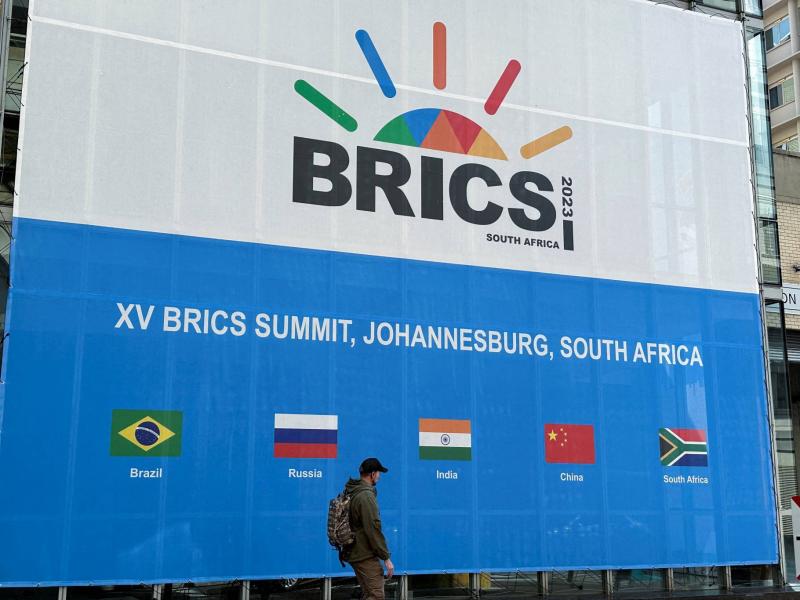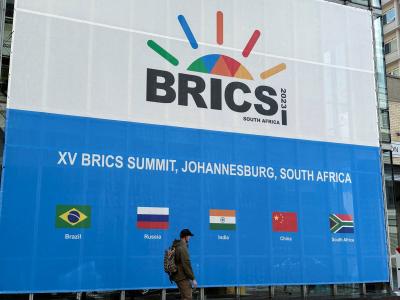When a British economist coined the acronym BRICS two decades ago to include the first letters of Brazil, Russia, India, and China, he did not envision the emergence of a coalition that might challenge Western dominance in international affairs. The BRICS countries began meeting officially in 2014 to enhance economic cooperation, having added South Africa to the group in 2010, which led to the collective name BRICS. The group now appears to have higher geopolitical ambitions. Jim O’Neill, then a banker at Goldman Sachs, was writing about investment opportunities in nations poised to become among the largest emerging markets in the world.
In a surprising decision at a summit held this week in Johannesburg, the group invited Saudi Arabia, Iran, Ethiopia, Egypt, Argentina, and the United Arab Emirates to join as members. This move aims to enhance BRICS' influence as a defender of what is termed the Global South, many of which feel unfairly treated by international institutions dominated by the U.S. and other wealthy Western nations. However, the expansion is likely to lead to more disputes within the group, which already struggles to make decisions due to the need for consensus. The merely announcing a joint statement regarding the expansion faced difficulties in lengthy negotiations on the criteria for accepting new members. Patrick Lukusa, a specialist in international cooperation at the University of the Witwatersrand in Johannesburg, said, "There will certainly be a problem if they do everything by consensus. The model has to change to a majority vote." He added, "There are already differences between the five countries on the common currency. What happens if we have ten more countries?"
"Political Polarization"
The commitments of BRICS leaders to defend the interests of non-Western countries mark a gradual shift in the group's focus from economics to geopolitics. Daniel Silk, director of the South Africa-based consulting firm Political Futures, stated, "Make no mistake, it's not just about trade. It's about the fragmentation and political polarization we are witnessing in the world." He added that China has indicated the possibility of a new Cold War with Washington as a justification for expanding the group. However, BRICS nations still have a long way to go to transform themselves into a united global organization capable of effectively challenging Western dominance over international institutions like the United Nations, the IMF, and the World Bank.
There have always been disagreements between the two heaviest members of the group, China and India. New Delhi is close to the West and has military deals with the United States, but it occasionally engages in violent conflicts with Beijing over their borders in the Himalayas. Among the approximately $33 billion in loans approved by the New Development Bank, two-thirds were in dollars. Meanwhile, Russian President Vladimir Putin uses the group as a forum to counter the West, which seeks to isolate Moscow over its invasion of Ukraine. Putin, in a video address Thursday, targeted Western powers, saying that the "neoliberalism" they embrace heralds a multipolar world not dominated by any one country or bloc. His statements seem to contradict those of his Brazilian counterpart, Luiz Inácio Lula da Silva, who said in a social media address during the summit Tuesday that BRICS is not intended to be a "counterbalance to the G7 or G20 or the United States." Lula emphasized Brazil's position of "defending the sovereignty and territorial integrity" of countries, a clear criticism of Russia for its invasion of Ukraine. He also proposed the idea of creating a common currency for trade and investment among BRICS nations, something the other members are not particularly enthusiastic about, despite all sharing a desire to reduce dependence on the dollar.
"Overstated Ambition"
Tom Lodge, a professor of peace and conflict studies at the University of Limerick, commented that BRICS' framework to become more like an actual organization is "under construction, but it still has a long way to go." The New Development Bank, established by BRICS countries in 2015 as an alternative to the IMF and the World Bank, has promised to increase lending in local currencies as a way to reduce members' exposure to dollar exchange rate fluctuations. However, out of approximately $33 billion in loans approved by the New Development Bank, two-thirds were in dollars, according to explanations provided by investors in April. Lodge said, "Much of BRICS' exaggeration relates to ambition... If they want to rebalance economic power and credit institutions not controlled by Western countries, BRICS has done very little, frankly, to achieve that goal."
Gustavo de Carvalho, a senior researcher at the South African Institute of International Affairs, noted that adding oil-rich countries to BRICS could provide much-needed liquidity for institutions like the New Development Bank. Yet, as the sometimes heated discussions in the G7 group representing the world's wealthiest democracies reveal, building cohesion requires more than just money. Carvalho stated, "It is too early to know whether BRICS will take the shape of an alliance," pointing out that there is often no consensus among current BRICS members on voting in the United Nations.




